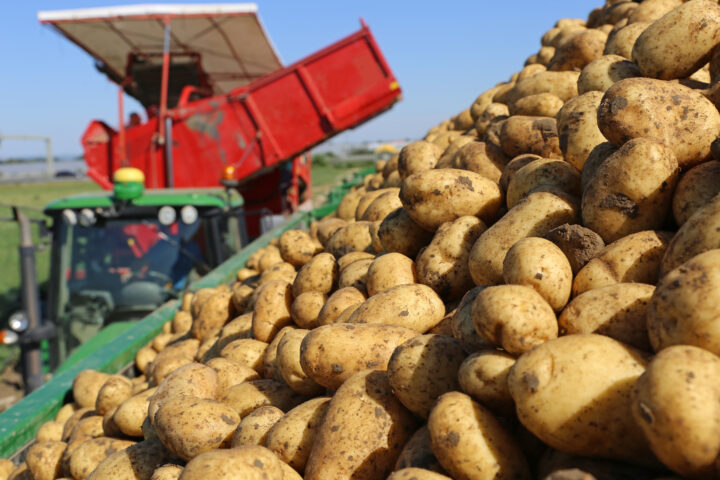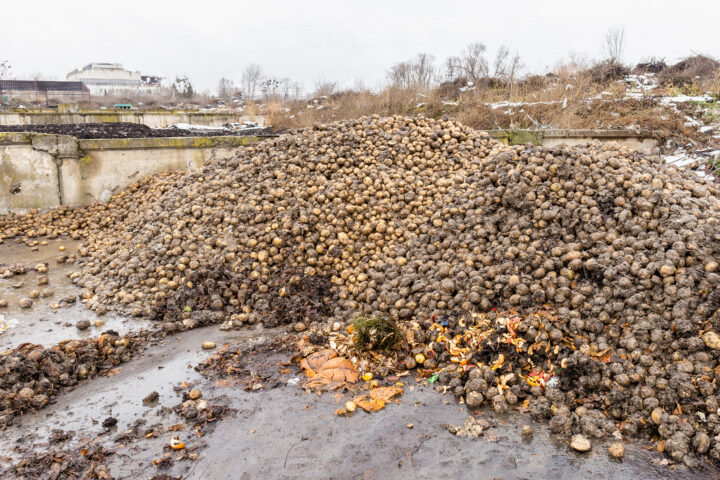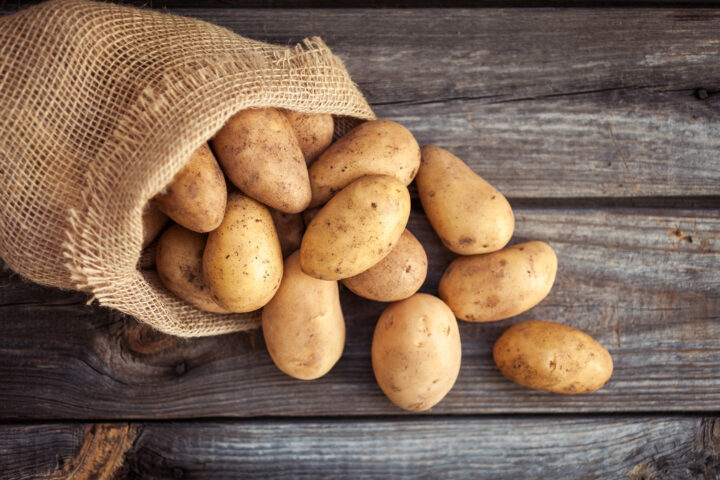
SRF Einstein on the potato crisis – more Steiner school than Einstein
Swiss potato production is under pressure – that is undisputed. The SRF science magazine Einstein recently reported on the potato crisis – and in a strikingly one-sided way. On the one hand, climate change is mentioned as the only cause of the precarious situation, while on the other hand, the only solution mentioned is robust varieties from conventional breeding. Modern breeding technologies such as Crispr/Cas or the use of pesticides are completely ignored.
Friday, February 14, 2025
The situation of Swiss potato producers is dramatic. For the third year in a row, they have had to accept massive crop losses. 2024 was even referred to as a ‘fateful year’ for potato production. Only those who followed a stringent crop protection strategy were able to harvest crops of decent quality and quantity. However, the situation was particularly precarious for organic farmers because they could only spray copper, which is immediately washed off by rain and loses its effect.
It is not surprising that the media are also jumping on the bandwagon – for example, the SRF science magazine Einstein. Unfortunately, however, the reporting is somewhat one-sided. A monocausal explanation is given as the main reason for the precarious situation of potatoes in Switzerland. Climate change is said to be the only culprit.
The tenor of the report is that heat waves and continuous rain affect the potato and increasingly cause crop failures. While the tuber stops growing at around 30 degrees Celsius, too much rain also causes late blight to spread, which also leads to widespread crop failure. The consequences are drastic: according to the report, the number of potato producers in Switzerland has been declining for decades. While there were still over 44,000 businesses in 1980, there are now only just under 4,000.
But the report falls short: ‘Einstein’, the SRF science programme, fails to mention that plant protection exists and is needed. It does mention that rain has caused late blight, but the link to plant protection is withheld. But late blight already caused total crop failures and massive famines more than 200 years ago – without climate change. Modern breeding methods such as Crispr/Cas are not mentioned at all in the 36-minute programme. And yet these are precisely the technologies that, unlike conventional untargeted breeding, can very specifically insert desired properties into existing varieties or eliminate undesired properties – and can also combat the consequences of climate change. There are also advantages from a consumer perspective: they do not have to be ‘re-educated’, but can continue to buy their proven varieties.
Robust varieties are not a panacea
Instead, the Einstein report refers only to the research of the Research Institute of Organic Agriculture (FiBL). This institute is working hard on the ‘potato of the future’ – a new robust variety that is both more heat resistant and less susceptible to disease.
However, the new variety will have to compete with established varieties on the market, because consumers are conservative: if they love a variety, they want to buy it. Taste, appearance and storage life play a major role. For retailers and processors, on the other hand, baking properties (e.g. for crisps and French fries), starch content, peel density, transport and storage life are important characteristics. Even if research has produced a new variety, it must first be able to establish itself in practice and also be able to compete in terms of price.
The ‘Einstein’ report gives the impression that conventionally bred, robust varieties are the panacea and that neither modern breeding technologies nor crop protection are needed. However, SRF itself has already reported several times that crop protection is essential if anything is to be harvested at all. What's more, according to the report, organic potatoes are now supposed to provide a remedy – although they ran out at the end of last year.
What ‘Einstein’ also fails to mention is that even robust varieties still need plant protection. There are simply no varieties that are 100 per cent resistant to everything. Moreover, so-called resistance breakthroughs occur sooner or later: the diseases prevail.
Consumers are not averse to new breeding methods
The one-sided presentation is striking and the report gives the impression of being written by someone who has never heard of the term ‘genome editing’ rather than by Einstein. Instead of dealing with innovations, new breeding technologies and modern pesticides are not mentioned at all. It is illusory to believe that robust varieties alone can solve all the problems in potato growing.
Instead of producing whitewashing articles, a science magazine should tell consumers the truth. The expertise would actually be available: the SRF magazine dedicated an entire programme to modern breeding methods two years ago. The programme clearly showed that the new methods are indispensable if we want to continue growing popular apple varieties such as Gala in Switzerland in the medium term. Even if the variety is susceptible to disease, consumers still want to continue eating Gala apples. At least consumers are not averse to new breeding methods if they see a benefit for themselves in a technology. This is shown by a recent survey conducted by gfs.
Sources
Kindly note:
We, a non-native editorial team value clear and faultless communication. At times we have to prioritize speed over perfection, utilizing tools, that are still learning.
We are deepL sorry for any observed stylistic or spelling errors.
Related articles

Potato farmers want robust varieties
As the use of crop protection has been massively reduced, the potato industry now wants to focus on more robust varieties. The industry has even concluded a target agreement with the federal government. This is ambitious: By 2040, robust varieties are to grow on 80% of potato cultivation areas.

Precarious situation for potato farmers
Potato farmers in Switzerland are sounding the alarm. Due to all the rain, late blight is spreading and destroying their harvest. There is talk of disastrous conditions or a "fateful year" for Swiss potatoes. 300 hectares of potato fields have already had to be abandoned - and more could follow. In the meantime, the federal government has also drawn the first conclusions.

Potato shortage due to capricious weather and lack of crop protection
The potato harvest is not looking good this year. There is a shortfall of 100,000 tonnes, as reported by the Aargauer Zeitung. According to potato producers, this is a drop of 30 per cent compared to the long-term average.

Ant infestation threatens Zurich communities
An invasive ant from the Mediterranean region is spreading rapidly in the canton of Zurich, threatening communities, construction projects, and agriculture. Insecticides could help—but their use remains severely restricted.

Genetic scissors for the future – soon in Switzerland too?
Genome editing is seen as a promising way to make agriculture more sustainable and climate-resilient. But Switzerland is hesitant to approve it. A popular initiative even wants to ban it. But what can CRISPR really do?

Less than 50 percent: How Switzerland is squandering its self-sufficiency
Swiss agriculture is under enormous pressure. Extreme weather conditions, pests and increasingly stringent regulations are putting producers under strain. As a result, self-sufficiency is falling dramatically, especially for plant-based foods. To ensure food security in Switzerland, effective plant protection products are urgently needed.

Only half the truth in the genetic engineering debate
Those who only see the risks remain blind to the opportunities offered by a new technology. Opponents of genetic engineering have presented a new survey on new breeding methods, which reveals some telling gaps.

